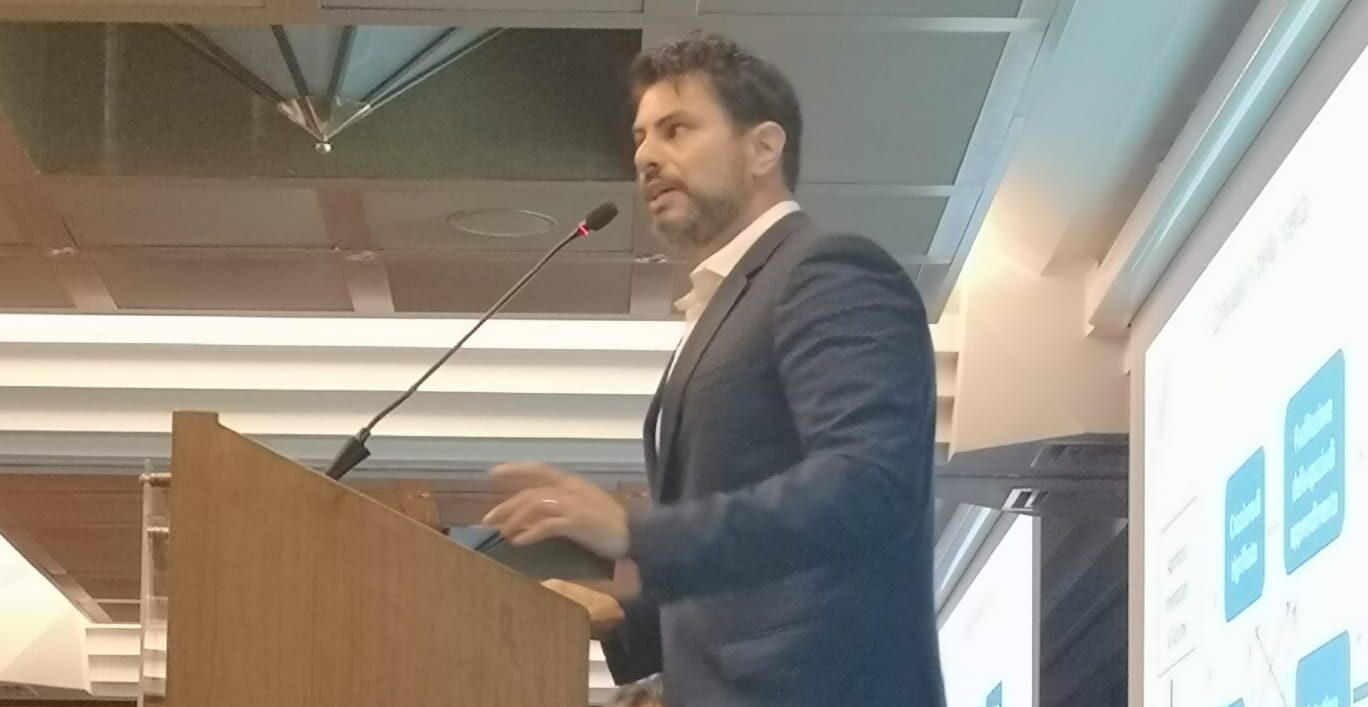School of English Language Professor Giacomo Folinazzo was recently invited to Naples, Italy to present research he conducted for his doctoral studies, sponsored by the Italian ministry of education.
The event gained national news coverage in national Italian newspaper La Stampa, as well as a segment on TG3 national news broadcast.
Folinazzo who is well known throughout the College for his former position as faculty representative on the NC Board of Governors and as a former program coordinator, is currently pursuing a PhD in Language and Literacies Education at the Ontario Institute for Studies in Education (OISE), University of Toronto, to be completed in September.
We caught up with Folinazzo to discuss his exciting research project, his passion for language education and his recent experience in Italy.
Tell us about your doctoral studies research
My research is based on the Common European Framework of Reference for Languages: Teaching, Learning, Assessment (Companion Volume) (CEFRCV), which is a seminal reference document to inform teaching and learning languages published by the Council of Europe. I focus primarily on Mediation and Mediation Strategies as well as the Action Oriented Approach and Theory of Plurilingualism and Pluriculturalism. My goal is to further my knowledge in the field of language education and contribute to the field. I am in the final stages of my dissertation.
Why did you choose this subject to research?
I lived in Italy for 15 years, not far from the city of Naples. Returning to that area as an expert in the field of language education was very meaningful both personally and professionally as it marked moment when my life came to full circle. In fact, I left Italy to pursue higher education and a career, and to be invited back to present about my research and my work on language education gave me a profound sense of satisfaction, especially because English is not my first language. Also, this was the first time for me to make an academic presentation in Italian, and I was proud of the results.
As a second-language user myself, a language teacher, and now a researcher, I am very interested in how languages can be best learned and taught. Action Orientation sees language learning as the completion of a real-life task (for example, organizing a party for a friend, ordering goods online, etc.) with the use of mediation strategies (for example, simplifying a dense text) within a real-life context (scenario). I have experienced the use of language for a tangible purpose both personally and professionally throughout the over 20 years of experience as a learner and teacher.
I have been teaching languages since 2003, and I have moved 21 times in my life and each time I had to learn a new dialect, or language, or culture.
As for all educators, I am in continuous search for a better way to teach our ever-changing students, and my passion for languages led me to pursue PhD studies.
I am very fortunate to have had the support of my department, the School of English Language Studies, my director Gary Torraville, the International Department, and Niagara College as a whole, with its tuition reimbursement program and recent announcements by President Sean Kennedy expressing NC’s focus on people development as part of the new Strategic Plan.
My motivation and desire to contribute to the field of language education would not bring any results without the support of NC, and I am very thankful for its dedication to support the development of faculty and ultimately the improvement students’ learning and experience.
How is your research tied to NC?
For my doctoral research, I conducted a study at NC with 12 participants who were English for Academic Purposes students. They completed five language mediation-based, action-oriented tasks in small groups on the Zoom platform. Upon completion, all participants were interviewed about their experience with the task completion.
I am also a proud member of NC’s Research Ethics Board.
Who is involved with your research?
My colleagues Alex MacGregor and Faith Marcel participated as peer observers in the research. They reviewed the task completion videos by the participants and offered their observations which I used as a starting point in my interpretation and data analysis in an effort to reduce inadvertent bias. Both colleagues are very experienced teachers and familiar with the theoretical framework of my study. Their contribution has been invaluable. My thesis supervisor, Dr. Enrica Piccardo has been my beacon for my theoretical framework and research methodology.
How did this opportunity to present your research in Naples come about?
LINguistic & Cultural Diversity Reinvented (LINCDIRE) is a project funded by the Social Sciences and Humanities Research Council of Canada headed by my OISE Professor and Thesis Supervisor Dr. Enrica Piccardo.
The project aims at formalizing and solidifying an international network of language educators and partnerships among institutions to promote the development of a plurilingual theoretical framework. This includes an online tool to offer a digital environment to the project called Language Integration through E-portfolio (LITE). One of the multiple partnerships of the project included the second phase of a successful collaboration with the Lombardy region in Italy last year.
Given the positive results, the project was expanded to three regions including Lombardy, Lazio and Campania. I was invited to be a research assistant and team leader for the Campania region.
When did you present your research in Naples?
The conference took place on May 31 and I presented two segments: one regarding my research at NC and one as a team leader for the research project. I also took part in roundtable discussions as a panelist in two different schools on May 30 and May 31, where language teachers shared their experiences with the methodology and asked panelists questions.
The conference was hosted by the head school Instituto Comprensivo Nicola Romeo (of Casavarore, Naples) by the principal Evelina Megale with funding from the Italian Ministry of Education at the Ramada Conference Centre, Naples.
The attendees were mostly language teachers from elementary to high school in the province of Naples, as well as members of the local school boards and regional administration.
What were the highlights of your research?
The most important finding for me comes directly from the voice of the participants and from their observed behaviour. In fact, the completion of mediation-based tasks within an Action-oriented Approach to language teaching increases awareness, motivation, and most of all autonomy in the learner.
The real-life tasks prove to be authentic in their setting on the one hand, and immediately useful on the other. Language learning occurs as a result of the mobilization of the learners’ entire language repertoire in problem solving and decision-making during task completion.
This is a significant step forward from the traditional present-practice-produce approach.
What did the experience mean to you?
I lived in Italy for 15 years, not far from the city of Naples. Returning to that area as an expert in the field of language education was very meaningful both personally and professionally as it marked moment when my life came to full circle.
In fact, I left Italy to pursue higher education and a career, and to be invited back to present about my research and my work on language education gave me a profound sense of satisfaction, especially because English is not my first language.
Also, this was the first time for me to make an academic presentation in Italian, and I was proud of the results.



